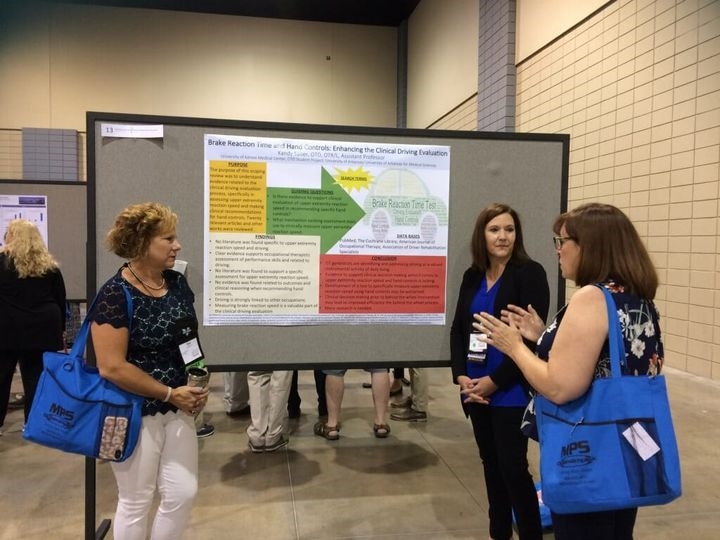
Kandy Salter, an assistant clinical professor in the Department of Occupational Therapy, recently spoke to an Arkansas chapter of Pi Theta Epsilon about her area of expertise, driver rehabilitation.
Pi Theta Epsilon is a specialized honor society for occupational therapy students and alumni that promotes research and scholarship. Salter is a Driver Rehabilitation Specialist, an active member of the Association of Driver Rehabilitation Specialists and an AARP CarFit Coordinator for Arkansas.
She brings a wealth of knowledge to students in the U of A occupational therapy doctoral program, a joint offering with the University of Arkansas for Medical Sciences. Salter has been an occupational therapist for more than 17 years, specializing in neurologic rehabilitation and driver rehabilitation. Over the years, she has helped people of all ages and abilities get safely behind the wheel again after an accident — or to help drivers with special needs discover alternative transportation. She might suggest vehicle modifications, adaptive equipment or behind-the-wheel training.
As a CarFit Coordinator, Salter organizes free community events where she and trained volunteers can determine how personal vehicles "fit" drivers who are over 65. The CarFit program also provides information and materials on community-specific resources to increase driver safety and community mobility. The organization is a collaboration between the American Occupational Therapy Association, AAA and AARP.
"Driving and community mobility enable individuals to engage in occupations outside their home," Salter said. "Mobility in one's community allows individuals to feel a greater sense of independence and control to participate in occupations such as work, education and leisure."
As a professor, Salter is able to share best practices for completing clinical and behind-the-wheel driving evaluations and provide resources related to this advanced, specialized area of practice.
Salter's road to becoming a DRS started when she partnered with the Northwest Arkansas Driving Academy to create a driver rehabilitation program in the region.
"The owner reached out and I essentially answered the call, literally and figuratively," she said. "The UAMS Outpatient Therapy Clinic was supportive and provided me with the opportunity to develop a clinical evaluation program for driving."
Then the Association of Driver Rehabilitation Specialists awarded Salter a scholarship to attend their "Introduction to Driver Rehabilitation" course in Dallas. She's since completed many hours of continuing education in the area and completed a brake reaction time study for her doctoral capstone in 2018.
"This area of practice has been incredibly rewarding. When someone can safely navigate and access their community, it improves their quality of life," she said. "Even when driver retirement or cessation is recommended, I work with individuals, families and support networks to come up with solutions.
"Exploring alternative solutions for driving and community mobility can be an emotional process. It's rewarding to see the people I work with discover hope."
Topics
Contacts
Shannon G. Magsam, director of communications
College of Education and Health Professions
479-575-3138, magsam@uark.edu